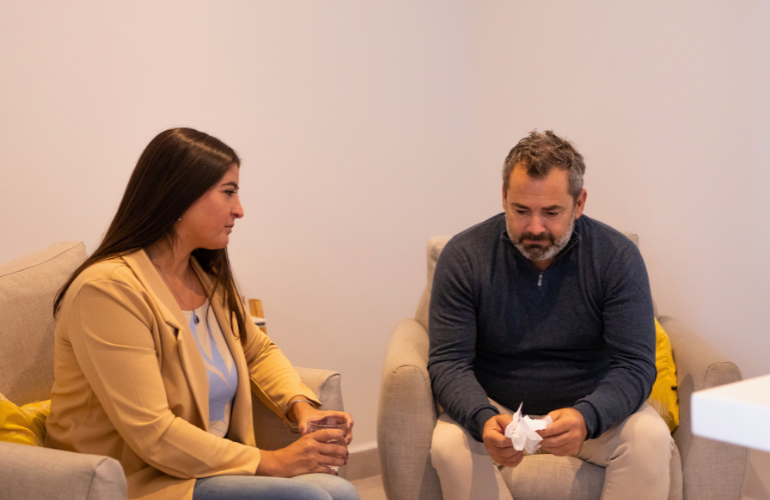I’m really not trying to jinx this. But I have to tell you what feels like HUGE news: I’m unlearning my avoidant attachment style!
Like, literally. I can feel my nervous system shifting and changing over the past few weeks.
I assume the neural pathways in my brain are rewiring. I’ve been less irritable and more open to talking to other people. Less “shy,” introverted, and self-conscious. Less tense in my body and more open to physical touch with my partner.
It’s blowing my mind and warming my heart. I feel like my life (and marriage and friendships and work as a therapist) has been transformed forever.
Here’s what an avoidant attachment style is
Let me catch you up. It’s very relevant to the way boys and men are socialized in this society.
According to developmental psychologists, everyone has an attachment “style,” the way we behave in close, intimate relationships.
Some people are what’s called “secure.” They’re more often than not able to trust others, feel comfortable with emotional closeness, and communicate their needs.
But decades of research and surveys have shown that most of us (and I would argue all of us to different degrees) are either “avoidant,” “anxious,” or “disorganized.”
Those with an avoidant style (like me) tend to be noncommittal, standoffish, and distant. We’re prone to avoiding conflict, canceling plans, not responding to calls/texts, and ghosting. We’re more likely to turn to drinking alone, YouTube, video games, and other forms of numbing out when we’re stressed.
Those with an anxious style tend to be more needy in relationships, get jealous easily, and lack boundaries. When stressed, they’re more likely to turn to hanging out with others, texting, social media, and other forms of communication.
Those with a disorganized style tend to be inconsistent, jumping back and forth from wanting to be extremely close to pulling away and distancing.
Before you jump to conclusions about your (or your partner’s) style, know that this is complicated stuff.
None of the styles are “bad” or a sign that we’re doomed in relationships.
Our style is programmed into the way our body and brain handle stimulation and stress. This programming happens through early childhood experiences with our parents or primary caregivers.
Our little kid nervous system came up with ways to cope with our caregivers’ inconsistency in meeting our needs for emotional safety, trust, attunement, and love. No parent can be perfect 100 percent of the time. Especially in this individualist, capitalist society, with so little support for working parents.
As life coach Sarah Baldwin writes, not having a secure attachment style “doesn’t mean there’s anything wrong with you. It’s simply your beautiful nervous system protecting you in the best way it knows how.”
Baldwin continues:
“Avoidance in our relationships often stems from a deep-rooted protective mechanism … Our nervous system might default to [a] shutdown response when conflict or overwhelming situations arise, trying to protect us by disconnecting from the situation. This can make us seem avoidant, even when we care deeply.”
I so relate to that. There are times sitting on the couch or lying in bed with my partner when I both don’t want her near me and want her near me at the same time.
It feels like I’m a magnet repelling another magnet. Part of me can’t handle the closeness when she comes in for a kiss or wants to talk about something emotional. But another part of me doesn’t want her to leave me alone.
There’s hope…
The last few sessions with my therapist have been game-changing. We’ve explored that magnetic repulsion sensation I get sometimes with my partner.
I’ve asked it questions, like it was a little boy inside of me. Why do you do that? How do you feel about doing it? What are you afraid would happen if you didn’t do it?
I’ve learned that it’s trying to protect me from a painful feeling I used to experience a lot as a kid: like no one truly understood or was curious about me.
With my therapist’s help, I told him I was curious about him, listened, and healed his wound.
Then my body relaxed. Particularly my face, which gets tense when I’m feeling avoidant. It felt like years of tightness released into the thin air inside my car. (I was seeing my therapist online sitting in a grocery store parking lot.)
Again, I hope I’m not jinxing it. We’ll see how long this lasts. But it feels like a tectonic plate has shifted in how I relate to other people.
If you have an avoidant style, I hope you get to experience this feeling too. Find a therapist who uses a “trauma-informed” and/or “somatic” style of therapy. My therapist uses Internal Family Systems (IFS), which is the type of therapy I use. As always, let me know if you need help: jeremy@jeremymohler.blog
Subscribe to get posts like these straight to your email inbox.
